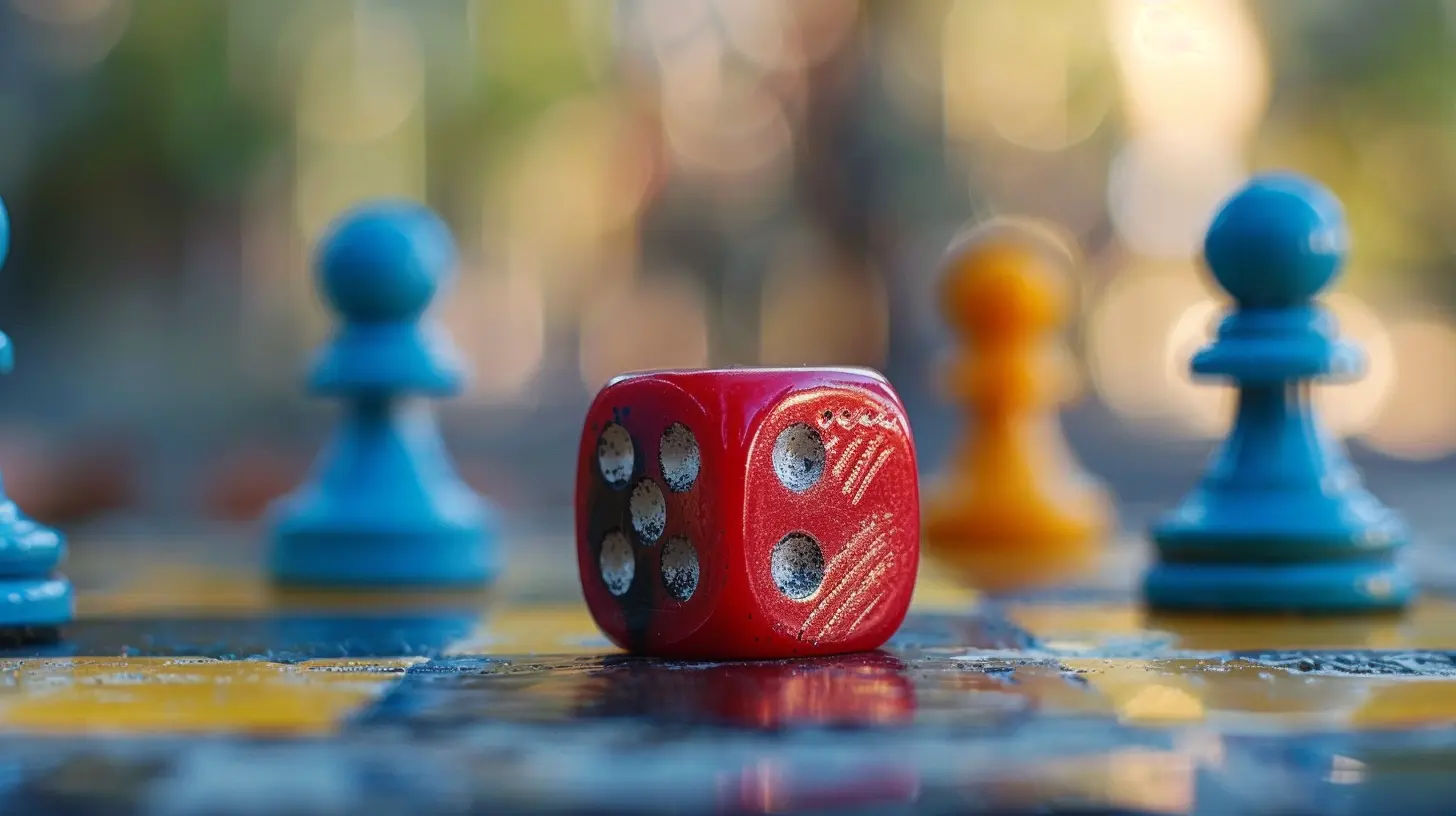Avoiding Common Mistakes in Competitive Online Play
22 February 2025
Competitive online gaming can be thrilling and nerve-wracking all at once. Whether you're a seasoned gamer climbing the ranked ladder or a newbie just dipping into the world of PvP (player versus player), mistakes happen. They’re part of the learning curve—and let’s face it, nobody starts off being a pro. But, there’s a difference between making mistakes while learning and repeating common missteps that sabotage your progress.
In this article, we’ll dive into those all-too-common blunders in competitive online play and how you can avoid them. Ready to level up your game? Let’s get into it.
1. Underestimating Communication
Ever heard the phrase, "Teamwork makes the dream work"? Yeah, that pretty much sums up competitive gaming. Yet, so many players forget that effective communication can turn potential chaos into a well-oiled machine.Why Communication Is Crucial
Most competitive games—whether it’s _League of Legends_, _Valorant_, or even _Rocket League_—require coordination. If you're the silent type or worse, someone yelling commands without listening to your team, you’re setting yourself up for failure. Think of communication as the GPS for your team. Without it, everyone's driving blind.How to Fix It
- Use Your Mic: Even if you’re shy, basic callouts like "enemy mid" or "let's push" can make a world of difference.- Stay Positive: Nobody wants to hear a Debbie Downer pointing out every mistake. Keep it constructive.
- Ping System: If you’re not into voice chat, use the built-in ping systems. Just don’t spam—it’s like honking in traffic; it annoys everyone.

2. Tunnel Visioning on Kills
Who doesn’t love racking up a highlight-reel-worthy kill streak? But if you’re chasing kills at the expense of objectives, you’re probably the player that makes your teammates roll their eyes.Why This Happens
It’s easy to get swept up in the adrenaline rush of taking down opponents. But most competitive games aren’t won by kill count alone. Objectives like capturing flags, planting bombs, or defending positions are often the key to victory.How to Fix It
- Know the Game’s Goals: Remind yourself why you're playing the game. If the goal is to capture zones, focus on that.- Balance Aggression: Sure, go for those kills, but not when it pulls you out of position or leaves your team hanging.
- Think Like a Strategist: Would you rather have 20 kills and a loss, or an average stat line but a W? Exactly.

3. Poor Time Management
Time is everything in competitive gaming. Wait too long to make a move, and you might miss your window of opportunity. Rush in without proper setup, and you’re handing your opponents free points.Examples of Bad Timing
- Overstaying in an enemy's zone, only to get ambushed when you try to retreat.- Pushing an objective at the wrong time, like when your team is dead or spread out.
- Wasting time farming XP or gold late-game when your team needs you in a fight.
How to Fix It
- Learn to Retreat: Sometimes the best move is knowing when to back off. It’s not about cowardice—it’s tactical.- Play Around Power Spikes: Know when your character or team composition is at its strongest. That’s when you make your move.
- Keep an Eye on the Clock: Certain actions, like respawn timers or late-game buffs, are all about timing. Watch the clock and plan accordingly.

4. Ignoring Game Updates and Meta Shifts
Competitive games are constantly evolving. Developers patch bugs, introduce new characters, tweak mechanics, and shake up the meta (the “most effective tactics available”). Falling behind on these changes can leave you frustrated and at a disadvantage.Why This Matters
Imagine trying to win a match with a character that just got nerfed into oblivion. Or worse, sticking to outdated strategies while everyone else is exploiting a new, more effective method. Not fun, right?How to Fix It
- Read Patch Notes: Look, reading patch notes isn’t exactly thrilling bedtime material, but it’s worth it.- Watch the Pros: Professional players often adapt to meta shifts faster than the general player base. Watch their streams or matches for insights.
- Experiment: Don’t be afraid to try out new characters, weapons, or strategies to see what fits the current meta.
5. Blaming Your Team for Everything
Let’s be real—sometimes, your team screws up. Maybe your teammate whiffed an easy shot or went AFK mid-game. But constantly blaming others not only makes you that guy (you know, the one no one wants to queue with) but also stunts your growth as a player.Why It’s Harmful
When you point fingers, you ignore what you could’ve done differently. Plus, it creates unnecessary tension, making your already challenging match even harder.How to Fix It
- Own Your Mistakes: Before typing, “You suck!” in chat, ask yourself, "Did I do everything I could to help?"- Focus on Improvement: Losing isn’t the end of the world. It’s a chance to learn and come back stronger.
- Mute If Necessary: If toxic teammates are dragging you down, mute them. Protect your mental health.
6. Skipping Warm-Up Sessions
Jumping straight into ranked games without warming up is like running a marathon with zero stretching—it’s a recipe for disaster. Cold hands, slow reflexes, or being mentally unprepared can lead to some regrettable first matches.Why Warm-Ups Are Key
A quick warm-up helps you shake off the rust and get into the zone. It’s like starting your car engine before hitting the highway.How to Fix It
- Practice in a Casual Mode: Most games have unranked or practice modes. Use them to get comfortable.- Focus on Mechanics: Whether it’s aiming in a shooter or last-hitting in a MOBA, take a few minutes to hone those skills.
- Don’t Rush: Give yourself time to slowly build momentum before diving into serious matches.
7. Neglecting Mental and Physical Health
Burnout is real, folks. Grinding for hours on end might sound hardcore, but it can actually hurt your performance. Fatigue, frustration, and even physical discomfort can pile up, turning you into your own worst enemy.Why This Happens
Competitive gaming can be addictive. You keep telling yourself, "Just one more game," until the next thing you know, it’s 3 a.m., and you’ve got five losses in a row.How to Fix It
- Take Breaks: Set a timer to step away from the screen every hour or so. Just a quick stretch or walk around the room can do wonders.- Stay Hydrated and Eat Well: Your brain needs fuel to function at peak performance. No, chugging energy drinks doesn’t count.
- Get Enough Sleep: Sleep-deprived you is not your best self. Trust me on this one.
8. Being Overconfident or Too Passive
There’s a fine line between confidence and cockiness. Similarly, being overly cautious can be just as detrimental. Finding that sweet spot of calculated aggression is key.Overconfidence Kills
Charging headfirst into battle without backup because you think you’re invincible? Big mistake. Trust me, running it down mid won’t earn you any MVP awards.Passive Play Hurts Too
On the flip side, if you spend the entire game avoiding fights or waiting for “the perfect moment,” you might miss your shot altogether.How to Fix It
- Play Smart, Not Cocky: Confidence is great, but remember, teamwork and strategy always win over solo heroics.- Take Calculated Risks: Assess each situation—does the potential reward outweigh the risk? If yes, go for it!
Final Thoughts
At the end of the day, competitive online play isn’t just about raw skill. It’s about awareness, adaptability, and mindset. Mistakes are part of the process, but avoiding these common pitfalls can help you climb the ranks faster and enjoy the journey more. Gaming is supposed to be fun, right? So, don’t sweat the losses—use them as stepping stones to improve and dominate.all images in this post were generated using AI tools
Category:
Game StrategiesAuthor:

Jack McKinstry
Discussion
rate this article
5 comments
Miriam Wilkins
Great tips! It's so easy to fall into those common traps when gaming online. I’ll definitely keep these in mind for my next match. Thanks for sharing!
April 5, 2025 at 2:51 PM

Jack McKinstry
Thank you! I'm glad you found the tips helpful. Good luck in your next match!
Emma Coffey
Great article! It’s so easy to fall into common pitfalls when gaming, but with a little awareness and practice, we can all level up our skills. Remember, even the best players started somewhere—just have fun and keep honing those strategies! Game on! 🎮✨
March 7, 2025 at 4:24 PM

Jack McKinstry
Thank you! I'm glad you found it helpful. Absolutely, practice and awareness are key to improving. Happy gaming! 🎮✨
Courtney Daniels
This article effectively highlights the crucial pitfalls many players encounter in competitive online gaming. By emphasizing strategic mindset and adaptability, it encourages gamers to reflect on their approaches, ultimately fostering growth and enhancing overall performance in the competitive arena.
March 3, 2025 at 5:39 PM

Jack McKinstry
Thank you! I'm glad you found the article insightful in addressing common pitfalls and promoting a growth mindset in competitive gaming.
Trevor Hurst
Great article! It’s essential for players to recognize and avoid common pitfalls in competitive online gaming. Focusing on teamwork, communication, and adapting strategies can make a significant difference. I appreciate the tips shared here; they offer valuable insights for both beginners and seasoned players aiming to improve their game.
March 3, 2025 at 3:45 AM

Jack McKinstry
Thank you! I'm glad you found the tips helpful. Focusing on teamwork and adaptability is key to success in competitive gaming!
Valeria Simmons
Great insights on competitive play! Emphasizing strategy over reflexes and maintaining composure can significantly enhance performance in online gaming.
March 1, 2025 at 4:15 PM

Jack McKinstry
Thank you! I'm glad you found the insights valuable; strategy and composure are indeed key to success in competitive gaming.
MORE POSTS

The Art of Subtlety: Hidden Stories and Secrets That Shape RPG Universes

What Happens When Games Go Through an Economic Crash

Roguelike RPGs: Embracing Change and Challenge in Every Playthrough

Moral Choices in Open World Games: Do They Really Matter?

Can Character Customization Improve Replayability in Games?